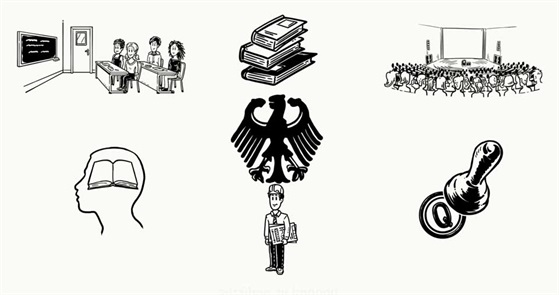🎓
Life in Germany > Education and Training

In Germany there is a standardized school and education system. The training courses, content and qualifications at schools and universities in the federal states are mostly the same.
Education starts rather very early in Germany; already in kindergardens the first elementary knowledge is taught. As soon as a child reaches a certain age (6 years), the so-called "school obligation" applies: Parents are then obliged to register their children at school. Compulsory education ends in Germany with the age of 18.
From the age of six, all children in Germany attend elementary schools. The pupils learn basic knowledge, such as reading, writing and calculating. If children have special mental or physical restrictions, they are often taught at a special schools.
Depending on the child's achievements and testimonies, the primary schools offer a recommendation for the secondary school after their completion. This is usually the case when the child is 10 to 12 years old. According to this recommendation, it is decided which of the three school forms (Hauptschule, Realschule, Gymnasium) the child is to be attending and which graduation can be reached. The secondary schools are usually specialized in one of the three school forms (Hauptschule, Realschule, Gymnasium); but there are also so-called Gesamtschulen, which offer several school forms and graduations.
A special case is represented by vocational schools in which pupils can acquire a so-called Fachabitur. Vocational schools are comparable to the Gymnasium, but they prepare a specific profession subject, for example the graphical or commercial industry.
Young people from the secondary schools have the opportunity to complete an education expertise. These are available in companies and handicraft businesses, in school form, as well as a combination of both. Reaching an education expertise in Germany takes between 2 and 4 years. They end with a degree, which is called Gesellenbrief. During training in companies as well as their combination with a vocational school, the pupils receive a training remuneration.
If a pupil has successfully completed the Abitur or Fachabitur, he is qualified to study in Germany. He can register at a general or specialized university or universities of applied sciences. For some subjects, a special requirement for admission is given in the form of a special school-leaving certificate (numerus clausus = NC). The study and the possible degrees are also standardized in Germany. There are bachelor, master and diploma degrees for most subjects. In addition, a doctor's degree can be obtained at universities.
The private schools play a special role in Germany. Here, too, the usual school leaving certificates are offered or courses of study with corresponding degrees. In contrast to state schools and universities, they have to be paid at very high rates.There are many opportunities in Germany to promote school and vocational education and training. As long as children still attend school or have an education, the parents receive so-called "child benefit". For students, there are also grants and scholarships, or special loans, to enable you to study and bear the cost of living during your studies.
In Germany, it is also possible for adults to complete certain school degrees. This is referred to as the "second path". This is usually done in special schools, e.g. only intended for adults, or where the lessons take place only in the evenings. Here, too, it is possible to reach school degrees by mail or online.
People who have attended school abroad, have completed or studied an apprenticeship, can have this recognized in Germany. There are standard procedures for countries within Europe. Countries outside Europe often need to be individually decided according to the case and situation. For the recognition of school, education or study all corresponding documents are necessary. They may have to be edited and certified by a translator.After entering the professional life, there are many opportunities to develop qualification. This applies to both professional and personal education. There are public schools, which offer this in classical school form. Similarly, there are remote universities with no presence obligation offering online services. Further education is welcome in companies, sometimes even required and possibly financially supported.Particularly important in Germany is further education in the field of computer and computer application. Computer-based systems are used in almost all industries and professions. Therefore, knowledge is required or highly recommended in this subject. This ranges from the normal use of programs to programming languages and computer technology.
There are many companies that specialize in further education in this field. One of these companies is Developer Media, a supporter of the Welcome App Germany. In addition to a broad range of training courses, Developer Media also offers webinars. These are short online trainings that take place live over the Internet. Developer Media is also the organizer of the Developer Week, one of the largest annual conferences in Europe on many topics related to computer, programming and software development.
For all educational topics and questions, there are competent authorities, counseling centers and contact persons in Germany, cities and municipalities in Germany. Schools and universities also provide information bureaus. These can be found within the app in the area of education in the respective regional data.

